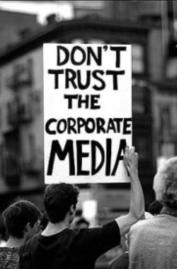“The media has been a major player in ‘hyping up’ the sense of danger and need for military action in many situations.”
By HELEN JOHNSON The Miscellany News, Vassar College May 20, 2021
This is the fifth article in a five-part series about the military-industrial-media complex. The fourth article,“The (im)proper meshing of the corporate media and the military-industrial complex,” can be found here.
I have now examined the military-industrial complex (MIC) and the corporate media each individually; explained how the MIC has expanded to include not only the arms makers, Congress and the military, but also oil companies, service and equipment providers, surveillance and technology companies and think tanks; examined how the consolidation of corporate power within the media industry has resulted in a handful of companies controlling 90 percent of our media, and how these huge corporations hold incredible political power, not just to influence politicians and legislation directly, but to subtly shape entire ideologies. In this installment, I illustrated how the corporate media is linked in many ways to the MIC, including through outright ownership, interlocking directorates, revolving doors and overreliance on the government and the military for information and access to the battlefield during war.
But how real is all this influence? Does the military-industrial-media complex (MIMC) actually affect the information we receive and our perception of war? In this article I’ll explain that yes, because of its enormous reach, the extreme consolidation of its power and its entanglement with the gigantic machine that is the MIC, the media today has failed to properly inform the American citizenry on matters concerning war. The MIMC manufactures pro-military opinion among the public; suppresses information relevant to military activities; provides a sanitized coverage of war; fails to investigate, criticize, or thoroughly debate issues of military involvement; too easily bends to pressure from government and military officials and sometimes even spreads outright lies and false information.
This has resulted in an American populus that, in general terms, is ill-informed, uneducated and misled in matters regarding military involvement, as well as overly militaristic and pro-war. Americans are thus unable to hold their government accountable for unnecessary or inappropriate use of military force, and are complicit in the perpetuation of American imperialism, colossal defense budgets that strip the country of severely lacking social programs and never-ending wars that kill and destroy while a handful of corporations reap immense profits.
The media has been a major player in ‘hyping up’ the sense of danger and need for military action in many situations. Douglas Kellner—American academic and sociologist—explains in his book, Media Spectacle and the Crisis of Democracy: Terrorism, War and Election Battles, how Sept. 11 was a prime example of the media spreading hysteria and fear among an already panicked and traumatized nation. He notes how the media obsessively focused on terrorism, possible threats and retaliation in the weeks and months after Sept. 11. It also handed a megaphone to extremism and did little to weed out the potentially dangerous or incorrect information being spread on its platforms.
Spreading hysteria and panic throughout the population had two effects: First, it made Americans feel heavily reliant on the government for protection and, according to Kellner, made any disagreement with or questioning of the Bush administration seem “unpatriotic and even treasonous.” Second, it was extremely profitable for the media companies themselves; with millions of eyes glued to TVs, newspapers and other media platforms, media consumption spiked and profits went up. Thus, the corporate media and the military-industrial complex both benefited from this collaboration.
Unfortunately, post-Sept. 11 is not the only time the media has contributed to a culture of hysteria surrounding potential military conflict. The watchdog group Fairness and Accuracy in Reporting (FAIR) reported in 2019 that “Media outlets are creating a climate for a U.S. military attack on Iran by hyping the idea that Iran is an imminent threat to peace, by failing to offer evidence that calls the U.S.’s accusations against Iran into question, by amplifying warmongers’ voices and by naturalizing America’s supposed right to spy on every country on earth.”
The U.S. never launched a large-scale invasion of Iran, but had the Trump administration decided to, the media had already primed the American public for it. Media outlets repeatedly presented Iran as a “threat,” even though the International Atomic Energy Agency said that Iran did not have a nuclear weapons program and there is reason to believe it had never been close to having one.
An important note here is that this type of behavior is by no means limited to right-wing or conservative news outlets. In its analysis, FAIR cited The New York Times, The Hill, the Associated Press, and The Washington Post—in addition to Fox News—as all contributing to this culture of hysteria. A separate FAIR article’s headline directs a pointed accusation at CNN: “CNN’s Iran Fearmongering Would Make More Sense Coming Directly From Pentagon.” No mainstream media outlet is innocent of pro-war fear mongering.
The media has also suppressed or downplayed information relevant to military activity on multiple occasions. For example, although the media did everything in their power to vilify Iraq and Saddam Hussein in the lead-up to and during the Iraq war, they completely ignored how the United States backed Hussein in the past. The United States played an integral role in Hussein’s rise to power and actively supported Iraq during the Iran-Iraq War—including going along with Hussein’s use of chemical weapons. However, this seemed to be irrelevant once Bush Jr. had made up his mind to invade Iraq.
Another instance of the U.S. media suppressing or failing to report information came during the middle of the Iraq War in 2004. On Jun. 28, 2004, the United States transferred sovereignty of Iraq in a secret ceremony, immediately after which Paul Bremer—who had been seen by Iraqis as a dictator—left the country. Bremer had heavily controlled Iraqi politics and privatized a huge portion of the economy, including handing out contracts to American firms like Halliburton. However, Bremer’s replacement wasn’t much better. The U.S. chose Ayad Allawi, who had ties to the CIA, to serve as interim prime minister until elections could be held, and the U.S. handpicked the rest of the Iraqi council as well. The two months following the transfer of power saw escalated violence and a continuation of the chaos that had been produced by Bremer.
But watching the news in the United States, you would think “we had turned a corner,” as President Bush repeated over and over again. If the media had thoroughly reported on the situation in Iraq, it could have led to a nationwide understanding that the war was doing more harm than good and serving the interests of huge corporations at the expense of American and Iraqi lives. A truly informed citizenry could have put public pressure on the Bush administration to end the war, or an electorate dissatisfied with the situation could have voted him out of office. Instead, it would be seven more years before the withdrawal of American troops from Iraq.
Suppressing or downplaying information isn’t the only way the mainstream media—in complicity with the MIC—has warped our understanding of war. The media also produces an extremely sanitized coverage of war: it avoids printing and broadcasting images of death and destruction; sidesteps discussions of American casualties and almost entirely refuses to mention casualties on the other side (which are usually much higher); and uses euphemisms like “collateral damage” and “air campaign” that hold very different connotations from what these phrases actually mean—i.e., innocent civilian death and continuous bombing.
Kellner notes that during the Iraq war, “Entire networks like Fox and the NBC cable networks provided little but propaganda and jingoism, as did for the most part CNN. All of the cable networks, as well as the big three U.S. broadcasting networks, tended to provide highly sanitized views of the war, rarely showing Iraqi casualties, thus producing a view of the war significantly different than that shown in other parts of the world.”
Sometimes a slant in news reporting is unintentional and unavoidable, due to the inherent bias of the American reporter which will inevitably present itself as pro-American bias, even if only subtly, no matter how hard they try to be objective. However, in matters regarding war and the military, the skewed and sanitized coverage is oftentimes much more intentional. Kellner notes that “During the war in Afghanistan, top executives of CNN circulated a memo telling reporters that if they showed news unfavorable to the United States, such as civilian casualties from U.S. bombing there, they should remind viewers that thousands of Americans died in the 9/11 attacks.”
Not only do reporters and news anchors oftentimes receive direct instructions from higher-ups on what to and what not to say, but there is also careful screening of experts and guests brought onto the TV networks during wartime. And, as noted in my previous article, many of these “experts” are former generals and Pentagon officials, whose talking points have been carefully scripted and who have been trained on how to speak about matters of war in order to paint the U.S. military and government in the best possible light.
The U.S. corporate media has also chronically failed to properly investigate, criticize and debate issues of war and military involvement. It tends to take the current administration’s account of the situation as fact, and during times of war or military tension, it is branded unpatriotic to criticize the government. Although there are many examples of the media’s failure to investigate and report the truth when it comes to war, the most egregious case was in the lead-up to the invasion of Iraq.
George W. Bush and Dick Cheney had planned from day one of their administration to invade Iraq. As explained in this article, Bush and Cheney—as well as Paul Wolfowitz, Donald Rumsfeld and others in and around the Bush administration—were either directly a part of or tangentially related to the neoconservative think tank PNAC, which was advocating for a regime change in Iraq as early as 1998. The fact that Bush planned to invade Iraq from the get-go has been confirmed by multiple officials close to the administration.
From the immediate aftermath of Sept. 11 up until the 2003 invasion of Iraq, the Bush administration waged a propaganda war to convince the nation that Saddam Hussein was linked to Al Qaeda and that he possessed weapons of mass destruction (WMD). These claims turned out to be false. Not only did Saddam Hussein have nothing to do with the Sept. 11 attacks, but Iraq was not in possession of WMD nor were they in the process of making any.
Even so, these allegations were widely circulated in the mainstream media. The nonpartisan Center for Public Integrity documented a total of 935 false statements made by top administration officials regarding the threat from Iraq before the war, and the majority of these assertions “were broadcast widely by U.S. media with little or no investigation of their credibility, and few rebuttals from war skeptics or dissenters.”
Not only did the media outlets completely fail to properly investigate these claims before broadcasting them to the nation—even The Washington Post and The New York Times admitted that they had uncritically published information fed to them by the Bush administration—but they continued to circulate the misinformation long after it had been disproven. Even after ABC, NBC and The Washington Post reported that the claims were false, Fox Television and other U.S. cable networks continued to play the stories about Iraq’s alleged connection with Al Qaeda and supposedly threatening weapons program.
The Bush administration had accomplished its goal: to convince enough of the American population, still reeling and traumatized from Sept. 11, that Saddam Hussein was dangerous—so that they could have their war. The failure on the part of the corporate media to investigate and criticize the Bush administration’s claims, and the continued circulation of these claims even after they were proven false, would lead to a disastrous eight-year long conflict resulting in hundreds of thousands of deaths.
There are many, many more instances of skewed reporting when it comes to war and military involvement. Not all of these instances involve outright lying to the American public or regurgitating government pro-war propaganda; many of the ways in which the corporate media influences our perception of war are small and relatively unnoticeable.
For example, FAIR reports how in December 2019, the mainstream media barely covered the passage of the National Defense Authorization Act (NDAA), which authorized $738 billion in Pentagon spending (an increase in $22 billion from the previous year). Across the most influential news outlets, including The New York Times, Washington Post, LA Times, USA Today, NPR, CBS, NBC, ABC, CNN and Fox News, the NDAA was covered in only 27 articles. In comparison, an ad campaign by Peloton was mentioned 57 times over a similar time period. It’s no surprise that the American public seems to have almost no issue with allocating billions upon billions of dollars to funding the world’s largest war machine, as opposed to using their taxpayer money to fund healthcare, education or other social programs—the establishment media has failed miserably at informing them about massive defense spending.
Another example of how the corporate media has let information regarding the military slip under the radar is in regard to the U.S. military’s massive contribution to carbon emissions. In June 2019, a FAIR review of a study by Neta Crawford for Brown University’s Costs of War Project confirmed previous findings that “the US military is ‘the single-largest producer of greenhouse gases (GHG) in the world,’ and that the Pentagon is responsible for between ‘77% and 80% of all US government energy consumption’ since 2001.” Surprised? That’s because the study received virtually no coverage in U.S. mainstream media, absent from The New York Times, Wall Street Journal, Washington Post, Los Angeles Times, NPR, PBS, ABC, MSNBC, CBS and CNN.
These smaller instances of media failures—oftentimes omitting or burying information, such as that regarding defense spending or the military’s carbon footprint—are less obvious and harder to track down. However, they are just as influential to the way the American public thinks about the military and war. Every missed opportunity to debate and discuss massive war spending in the mainstream media; every time an important study like the Costs of War Project is ignored; every instance of altered language or wording that minimizes or obscures the incredible resources devoured by war and the massive amounts of death and devastation it causes—each of these instances shapes the citizenry’s understanding of war and military involvement. Taken together, they combine to create a narrative in the corporate mainstream media that manufactures support for war and renders the American citizenry incapable of holding their government to account when it comes to the military and war.
This nation was founded on the principles of a free press, without which a government “of the people, for the people, and by the people” is simply an empty aspiration and not a reality. The mainstream, corporate media is not a free press, but is beholden to profits—of both the media corporations themselves and the military- industrial complex, with which it is so deeply intertwined. If we care about the free press; if we care about the so-called principles upon which the United States was founded; if we care about the lives of American citizens and the lives of those peoples whom we destroy and ravage with war; if we care about peace; if we care about democracy—if we care about these things, we must find a way to curb the military-industrial-media complex and foster an alert and knowledgeable citizenry, so that security and liberty may, in fact, prosper together.
SUBSCRIBE AND DONATE TO RISE UP TIMES
Truth is not fake news.
Justice is not fake news.
Rise Up Times needs your help to bring you timely articles and information about so many important current issues in these Rise Up Times. Subscribe to RiseUpTimes.org Support independent media. Please donate today and share articles widely.
The contents of Rise Up Times may or may not reflect the views of the editor.
2 Comments
Comments are closed.




[…] The military-industrial-media complex renders the American populus ill-informed in matters regarding… […]
[…] The military-industrial-media complex renders the American populus ill-informed in matters regarding… […]